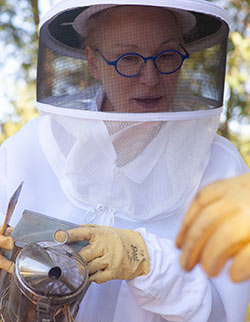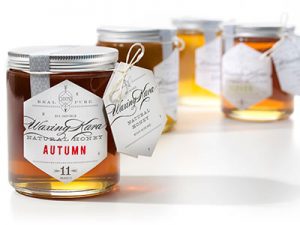American View
Personality
Holidays
Rosh Hashanah
Making Honey as a Third Career

Artisan beekeeper Kara Brook has some ideas about how to jazz up your Rosh Hashanah honey cake. “When I’m baking, I like to use the darker honeys—buckwheat and avocado, versus lighter varieties like clover,” said Brook, a 53-year-old honey entrepreneur on Maryland’s Eastern Shore. “It’s the difference between Guinness and Corona.”
At the intersection of Jewish, foodie and sustainability cultures is Waxing Kara, the line of kosher honey and honey-based products Brook launched in 2012. You might call her an accidental beekeeper: Brook’s third career, after graphic design and a small technology business, was supposed to be painting, not honey. But after stumbling on a paint made from beeswax, “it occurred to me that if I had my own bees, I could get my own wax,” recalled Brook.
 The rest is history. At her apiary, wildflower farm and laboratory, Brook grows clover and lavender for both the bees and her natural, sustainable lip balms, body scrubs, soaps and candles that are sold nationwide at stores like Anthropologie and West Elm.
The rest is history. At her apiary, wildflower farm and laboratory, Brook grows clover and lavender for both the bees and her natural, sustainable lip balms, body scrubs, soaps and candles that are sold nationwide at stores like Anthropologie and West Elm.
For the holidays, which coincide with September’s National Honey Month, Brook is stirring “savory” avocado honey—from the nectar of avocado blossoms—into fennel braised in wine. And even though “honey is naturally kosher,” explained Brook, her farm, for good measure, has Star-K certification.










 Facebook
Facebook Instagram
Instagram Twitter
Twitter
Susanna Levin says
Honey is naturally kosher, but so is chicken — it’s all in the processing. Honey is not poured out of the hive into the jar. Processing of raw honey can involve the use of lard, which would render it very not kosher. Certified kosher honey ensures that this does not happen.